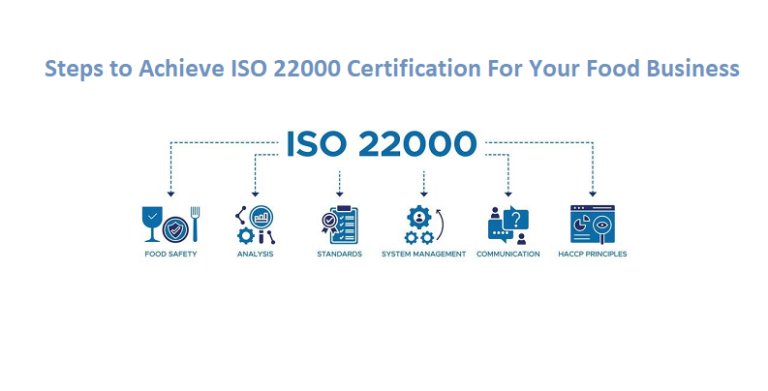Food safety is a priority for food businesses. Iso certifications for food safety help businesses maintain strict food safety standards. The iso certification for food safety makes businesses stand out in the competitive food industry market.
The certification promotes systematic management of food safety processes. Companies need iso for food safety management system to stay ahead of industry standards. In this guide you will learn the process of achieving an iso 22000 certain in four easy steps. Start by understanding the iso certification.
The iso certification creates a strong base for food safety in food manufacturing and processing units. This certification covers all aspects of the food chain from farming to packaging. Businesses need to follow some simple steps to achieve this certification.
This standard focuses on hygiene maintenance and preventing impurities during food processing. Iso for food safety management builds trust among customers and stakeholders.
Steps To Achieve The Certification
Some steps that businesses should follow to achieve an iso certification are:
Step 1- Preparation
Business must start by understanding the basic requirements of this standard. A detailed gap analysis highlights areas that need improvement in current operations. Businesses should create a clear implementation plan with specific timelines. The management team must allocate proper resources for the certification process. Proper training sessions help employees understand their roles in food safety.
Step 2- Implementation
Businesses need to establish clear food safety policies based on ISO guidelines. Every process requires proper documentation to maintain transparency in operations. Staff members need regular training so that they can handle food items safely. The management must set up monitoring systems to track food safety measures. Iso for food safety management system requires strict adherence to cleaning schedules.
Step 3- Audit
Internal audits to check if all processes match ISO requirements perfectly, while external certification bodies conduct thorough inspections of food safety systems. Businesses must have a proper record of all their food safety activities, so that one can identify areas that need immediate attention. Quick resolution of issues speeds up the certification process.
Step 4- Maintaining Certification
Regular monitoring ensures continued compliance with ISO standards. Businesses must update their processes based on new food safety guidelines and offer periodic training to staff members to maintain high safety standards. Management reviews help track the effectiveness of food safety measures and documentation updates keep the system current and efficient.
A trusted service provider guides businesses through the entire certification process. Expert consultants analyze current systems and suggest necessary improvements.
Experts provide customized solutions based on specific business needs and their professional guidance saves time and reduces certification costs significantly. Their regular support ensures smooth implementation of required changes.
So, achieving ISO 22000 certification marks a significant milestone for food businesses. The iso certification process requires dedication and systematic planning. This certification help food businesses with increased customer trust and improved operational efficiency.
The certification opens doors to new business opportunities worldwide, allowing businesses to grow. With professional guidance businesses can make their certification journey smooth and successful.
Transform your food business with IL Agency Services – Your trusted partner for ISO 22000 certification. Expert guidance. Proven results. Contact them now for a free consultation.

